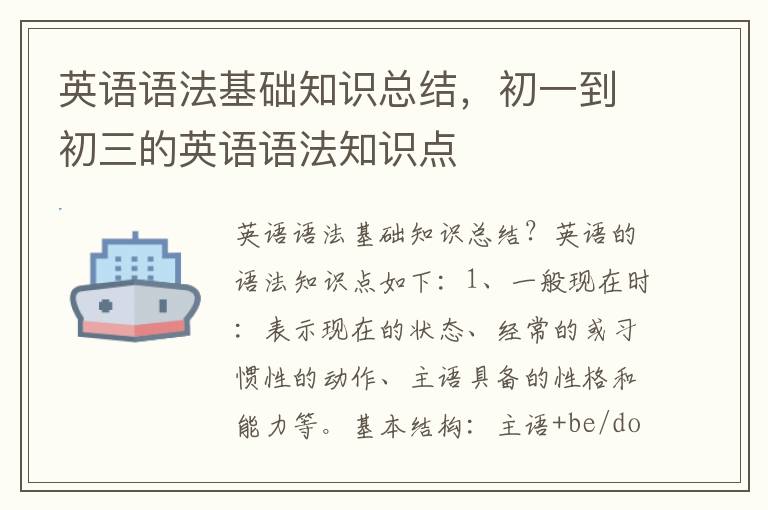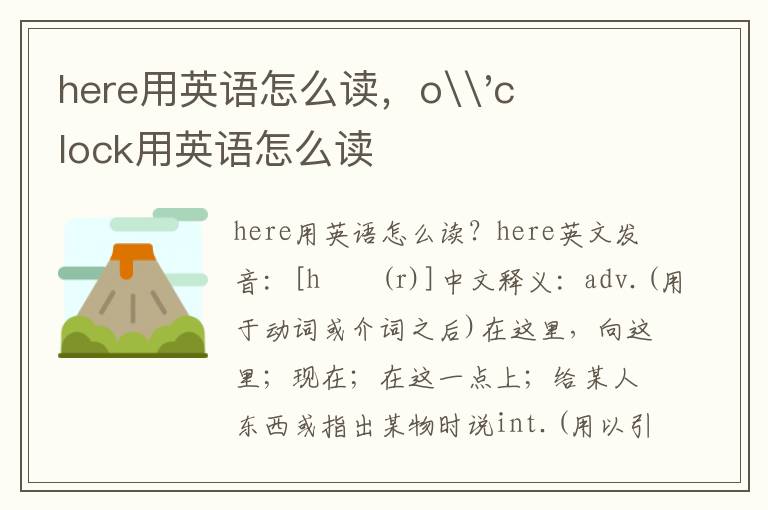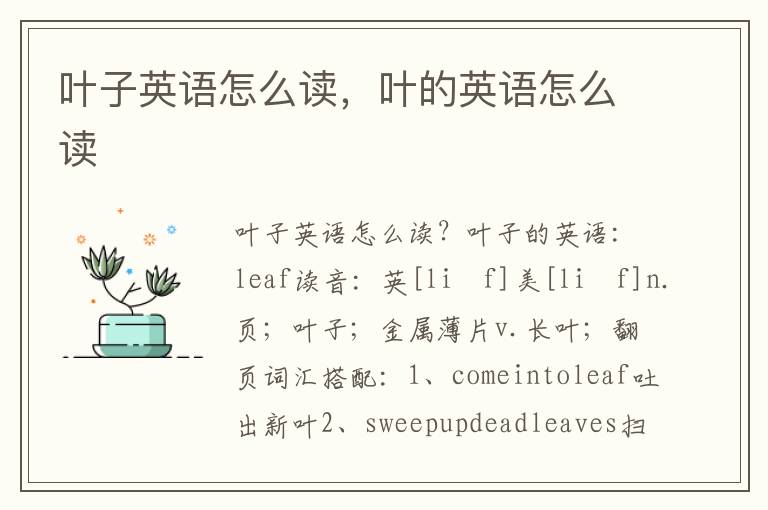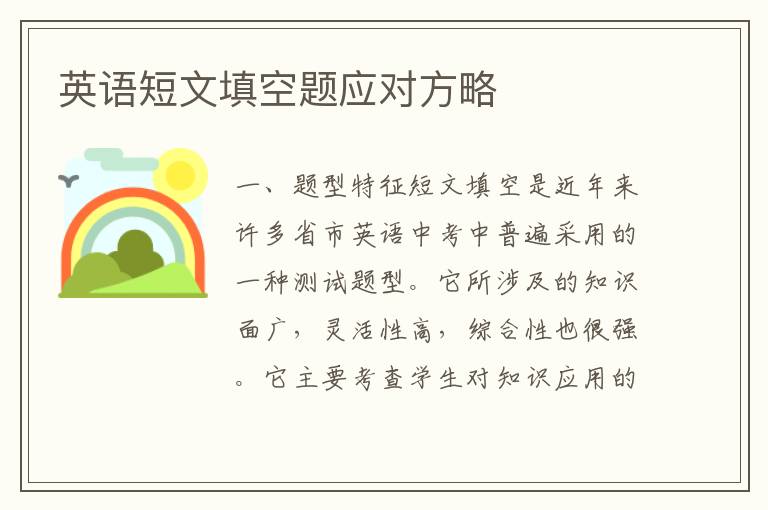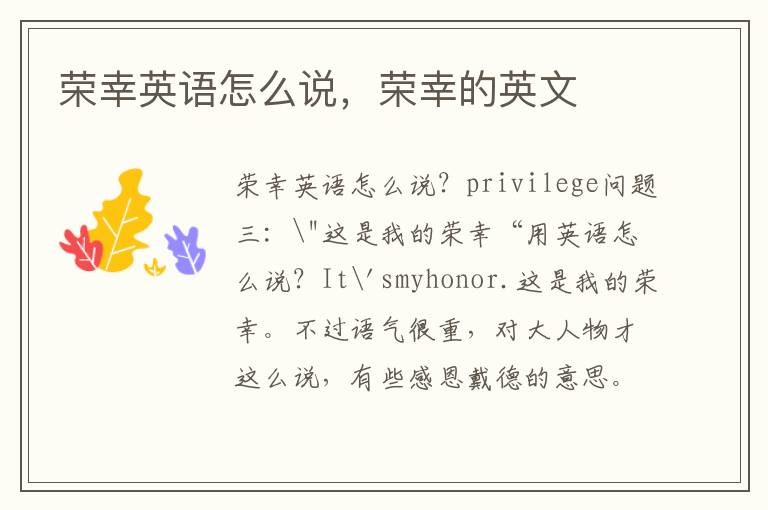【简介】感谢网友“雕龙文库”参与投稿,这里小编给大家分享一些,方便大家学习。
反意疑问句是初中阶段的一个重点和难点,突破它并不难,只要大家能从以下几个方面着手,我想定会让你豁然开朗:
?
反意疑问句(Disjunctive Questions )的定义:
反 意疑问句又叫附加疑问句(tag question)在陈述句之后,附加上一个简短句,对陈述句所叙述的事情提出的事情提出相反的疑问,这种疑问句叫反意疑问句。换句话说,反意疑问句由两 部分组成,前一部分是对是对事物的陈述,后一部分是针对所提出是事提出疑问。如果前一部分用肯定式,后一部分就用否定式;如果前一部分用否定式,后一部分 就用肯定式。
反意疑问句陈述部分用降调,简短问句部分可以用升调,也可以用降调,这得由提问者决定。提问者对陈述部分把握较大时,问句用降调;把握不大时用升调。
?
反意疑问句前后两部分所遵循的规则:
1. 前后语气相反。
A.前一部分用肯定式,后一部分就用否定式。
(1.)You are a student,aren’t you ?
(2.)She reads Chinese every day,doesn’t she?
(3.)John went to school, didn’t he?
(4.)She has done his homework,hasn’t he?
(5.)They can speak English, can’t they?
(6.)You will come in, won’t you?
B.前一部分用否定式,后一部分就用肯定式。
(1.)He isn’t a singer,is he?
(2.)They don’t play the guitar,do they?
(3.)You couldn’t write it, could you?
(4.)We did n’t see Tom, did we?
(5.)She hasn’t seen Lily, has she?
(6.)he can’t ride the bike,can he?
2.前后人称一致。
(1).We are teachers ,aren’t we?
(2.)She comes from Japan,doesn’t she?
(3.)He read maths every day last year,didn’t she?
(4.) They have done their work, haven’t they?
(5.)It will be fine, won’t it?
3.前后时态一致。
(1.)You are a teacher ,aren’t you?
(2.)He comes from Japan,doesn’t he?
(3.)She studied Chinese last year,didn’t she?
(4.) They have learned English, haven’t they?
(5.)It will rain , won’t it?
4.简短问句部分要用缩写形式。
(1.)You are a student,aren’t you ?
(2.)She reads Chinese every day,doesn’t she?
(3.)John went to scholl, didn’t he?
(4.)She has done his homework,hasn’t he?
(5.)They can speak English, can’t they?
(6.)You will come in, won’t you?
5.简短问句部分的主语要用人称代词主格。
(1.)This book is yours,isn’t it?
(2.)Tom dosen’t know me, does he?
(3.)Lucy and Lily played the piano,didn’t they?
(4.)Kate’s dog has eaten 3 chichens,hasn’t it?
(5.)His desk and bike are red,aren’t they?
(6.)His milk isn’t bad, is it?
?
反意疑问句中的特例。
(1.) There be 变成be There:
There are 3 dogs ,are there?
(2.)I am a worker,aren’t an’t I?
(3.)陈述部分是祈使句时,从句应具体情况具体对待。
*Don’t forget it will you? (不用Won’t you? )
*Come here early please,willwon’t you?
*Let’s go to the beach, shallshan’t we?
*Let us go to the beach, willwon’t you?
(4.)陈述部分谓语是think,suppose,believe,expect等,且主语为第一人称或第二人称时,简略句肯定或否定语气与主句对应,而主语和时态却与从句一致。
*I don’t think you are right,are you?
*I don’t believe he has done it,has he?
(5.) 当陈述部分的主语为代词-body,-one构成的不定代词时,简略句的主语多用they; 当陈述部分的主语为-ing构成的不定代词时,简略句的主语多用it.
*Everyone is here,aren’t they?
*Playing football in the street is right, isn’t it?
(6.)当陈述部分的主语为代词: this,that,nonthing,不定式,动名词或从句时,简略句的主语用it,陈述部分的主语为these,those,nobody,eveybody,somebody等,简略句的主语用they。
*That is a dog,isn’t it?
*These are apples, aren’t they?
*Nothing is right, is it?
*To see is tobelieve, isn’it?
*Everyone comes here ,don’t they?
*Nobody can help us,can they?
* Everything is ready,isn’t it?
(7.)当陈述部分的主语含有no,never,hardly,little,seldom few,
等词,这部分按否定处理,为简略句应用肯定式。
*He can hardly read English,can he?
*It seldom rains here,does it?
*He has no classes today,does he?
(8.)当陈述部分的主语含有un-,-less,dis-等带有前(后)缀的词,这部分按肯定处理,简略句应用否定式。
*It is unfair ,isn’t it?
*He dislike it, doesn’t he?
(9.)当陈述部分的情态动词表推测时的特殊情况:
当陈述部分的情态动词表推测时简略句应以情态动词后的动词为标准,去作相应的变化。
*Jack must have arrived here,hasn’t he?
*Li Ping must have finished her work last night,didn’t she?
? 反意疑问句的特殊答语。
对于反意疑问句的的回答,不管问题的提法如何,如果事实是肯定的,就用yes,如果事实否定的,就用no 。
当陈述部分为否定时要特别注意,这时的英语和汉语的答语是不同的。例如:
(1.)当陈述部分为肯定,简略句部分为否定时的答语和一般疑问句相同。
*He is a student,isn’t he?
*Yes,he is. No, he isn’t.
是的,他是。不,他不是。
(2.) 当陈述部分为否定,简略句部分为肯定时的答语。
当陈述部分为否定,简略句为肯定时的答语,时意义就会和汉语大相径庭:Yes, No和汉语的意义相反。
*Kate didn’t play the piano yesterday, did she?
*Yes,she did. No, she didn’t.
不,他 弹了。是的,他没弹。
*They aren’t reading the book,are they?
*Yes,they are. No, he are’t.
不,他们正在读,是的,他们没读。
*Lucy didn’t ride the bike,did she ?
*Yes,she did. No, she didn’t.
不,她骑了。是的,他没骑。
大家在平常只要能巧记、多用。特殊情况,特殊对待,在交际中会轻松掌握。相信:以不变去应万变,因为“万变不离其宗。”
反意疑问句是初中阶段的一个重点和难点,突破它并不难,只要大家能从以下几个方面着手,我想定会让你豁然开朗:
?
反意疑问句(Disjunctive Questions )的定义:
反 意疑问句又叫附加疑问句(tag question)在陈述句之后,附加上一个简短句,对陈述句所叙述的事情提出的事情提出相反的疑问,这种疑问句叫反意疑问句。换句话说,反意疑问句由两 部分组成,前一部分是对是对事物的陈述,后一部分是针对所提出是事提出疑问。如果前一部分用肯定式,后一部分就用否定式;如果前一部分用否定式,后一部分 就用肯定式。
反意疑问句陈述部分用降调,简短问句部分可以用升调,也可以用降调,这得由提问者决定。提问者对陈述部分把握较大时,问句用降调;把握不大时用升调。
?
反意疑问句前后两部分所遵循的规则:
1. 前后语气相反。
A.前一部分用肯定式,后一部分就用否定式。
(1.)You are a student,aren’t you ?
(2.)She reads Chinese every day,doesn’t she?
(3.)John went to school, didn’t he?
(4.)She has done his homework,hasn’t he?
(5.)They can speak English, can’t they?
(6.)You will come in, won’t you?
B.前一部分用否定式,后一部分就用肯定式。
(1.)He isn’t a singer,is he?
(2.)They don’t play the guitar,do they?
(3.)You couldn’t write it, could you?
(4.)We did n’t see Tom, did we?
(5.)She hasn’t seen Lily, has she?
(6.)he can’t ride the bike,can he?
2.前后人称一致。
(1).We are teachers ,aren’t we?
(2.)She comes from Japan,doesn’t she?
(3.)He read maths every day last year,didn’t she?
(4.) They have done their work, haven’t they?
(5.)It will be fine, won’t it?
3.前后时态一致。
(1.)You are a teacher ,aren’t you?
(2.)He comes from Japan,doesn’t he?
(3.)She studied Chinese last year,didn’t she?
(4.) They have learned English, haven’t they?
(5.)It will rain , won’t it?
4.简短问句部分要用缩写形式。
(1.)You are a student,aren’t you ?
(2.)She reads Chinese every day,doesn’t she?
(3.)John went to scholl, didn’t he?
(4.)She has done his homework,hasn’t he?
(5.)They can speak English, can’t they?
(6.)You will come in, won’t you?
5.简短问句部分的主语要用人称代词主格。
(1.)This book is yours,isn’t it?
(2.)Tom dosen’t know me, does he?
(3.)Lucy and Lily played the piano,didn’t they?
(4.)Kate’s dog has eaten 3 chichens,hasn’t it?
(5.)His desk and bike are red,aren’t they?
(6.)His milk isn’t bad, is it?
?
反意疑问句中的特例。
(1.) There be 变成be There:
There are 3 dogs ,are there?
(2.)I am a worker,aren’t an’t I?
(3.)陈述部分是祈使句时,从句应具体情况具体对待。
*Don’t forget it will you? (不用Won’t you? )
*Come here early please,willwon’t you?
*Let’s go to the beach, shallshan’t we?
*Let us go to the beach, willwon’t you?
(4.)陈述部分谓语是think,suppose,believe,expect等,且主语为第一人称或第二人称时,简略句肯定或否定语气与主句对应,而主语和时态却与从句一致。
*I don’t think you are right,are you?
*I don’t believe he has done it,has he?
(5.) 当陈述部分的主语为代词-body,-one构成的不定代词时,简略句的主语多用they; 当陈述部分的主语为-ing构成的不定代词时,简略句的主语多用it.
*Everyone is here,aren’t they?
*Playing football in the street is right, isn’t it?
(6.)当陈述部分的主语为代词: this,that,nonthing,不定式,动名词或从句时,简略句的主语用it,陈述部分的主语为these,those,nobody,eveybody,somebody等,简略句的主语用they。
*That is a dog,isn’t it?
*These are apples, aren’t they?
*Nothing is right, is it?
*To see is tobelieve, isn’it?
*Everyone comes here ,don’t they?
*Nobody can help us,can they?
* Everything is ready,isn’t it?
(7.)当陈述部分的主语含有no,never,hardly,little,seldom few,
等词,这部分按否定处理,为简略句应用肯定式。
*He can hardly read English,can he?
*It seldom rains here,does it?
*He has no classes today,does he?
(8.)当陈述部分的主语含有un-,-less,dis-等带有前(后)缀的词,这部分按肯定处理,简略句应用否定式。
*It is unfair ,isn’t it?
*He dislike it, doesn’t he?
(9.)当陈述部分的情态动词表推测时的特殊情况:
当陈述部分的情态动词表推测时简略句应以情态动词后的动词为标准,去作相应的变化。
*Jack must have arrived here,hasn’t he?
*Li Ping must have finished her work last night,didn’t she?
? 反意疑问句的特殊答语。
对于反意疑问句的的回答,不管问题的提法如何,如果事实是肯定的,就用yes,如果事实否定的,就用no 。
当陈述部分为否定时要特别注意,这时的英语和汉语的答语是不同的。例如:
(1.)当陈述部分为肯定,简略句部分为否定时的答语和一般疑问句相同。
*He is a student,isn’t he?
*Yes,he is. No, he isn’t.
是的,他是。不,他不是。
(2.) 当陈述部分为否定,简略句部分为肯定时的答语。
当陈述部分为否定,简略句为肯定时的答语,时意义就会和汉语大相径庭:Yes, No和汉语的意义相反。
*Kate didn’t play the piano yesterday, did she?
*Yes,she did. No, she didn’t.
不,他 弹了。是的,他没弹。
*They aren’t reading the book,are they?
*Yes,they are. No, he are’t.
不,他们正在读,是的,他们没读。
*Lucy didn’t ride the bike,did she ?
*Yes,she did. No, she didn’t.
不,她骑了。是的,他没骑。
大家在平常只要能巧记、多用。特殊情况,特殊对待,在交际中会轻松掌握。相信:以不变去应万变,因为“万变不离其宗。”




